IRELAND NEWSLETTER
February 2018

Cahirsiveen in Kerry image from free public domain photos of Ireland
|
IN THIS ISSUE
- News from Ireland
- Sadhbh, Cursed by a Dark Druid
- The Spirit Horse by T. Crofton Croker
- Half an Egg by Marie O'Byrne
- The Murder of Smith O'Brien - Irish Newspapers Revisited
- Gaelic Phrases of the Month
- Monthly Free Competition Result
Popular Articles from Recent Newsletters:

FOREWORD
Hello again from Ireland that is in the middle of an arctic blast! Truly March can be an amazing month. Beautiful crisp sunshine one day. Torrential downpours the next.
This month we have another tale from Marie O'Byrne, the story of Sadhbh, mother of the legendary Oisín, an old story from T. Crofton Crocker and a news report about the conditions in a Tasmania Penal Colony!
If you have an article or story you would like to share then please do send it in.
Until next time,
Michael

P.S.
Please Do Forward this Newsletter to a
friend or relative. If you have a website or Facebook
page or Blog (or whatever!) then you can help
us out by putting a link on it to our website:
www.ireland-information.com
|


Get Ready for Saint Patrick's Day Now - Dont Delay!!
find out more
|

NEWS FROM IRELAND
VULTURE FUNDS CONTROVERSY IS A LEGACY OF THE CRASH
The crash of the property market in Ireland in 2008-9 and the subsequent collapse of the banking sector wreaked absolute havoc.
Ireland was lumbered with debts for a generation by the EU/ECB/IMF who brokered a deal to keep the ATM machines working once Ireland agreed to pay back French and German bond-holders the billions they had invested.
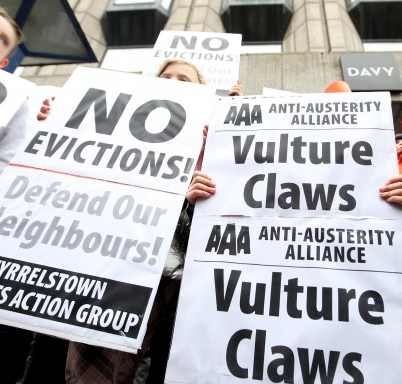
It was a typical example of private debt being nationalized and converted into public debt. It is a process that has happened many times in world history in many countries but is the first time that Ireland has suffered such a massively damaging blow.
Many private home-owners were left in the lurch. Those who could still afford to pay their mortgages did so. Those who struggled mostly struggled on while those who could not were left in the greatest difficulty.
Against this backdrop and a decade later the announcement that Permanent TSB and Ulster Bank are to sell a huge tranche of 'under-performing' mortgages, over 25,000, to private funds has been met with a surprising degree of opposition.
Statements by the hierarchy of the banks that 'some' of the loans being sold have not had a single repayment for over seven years have fallen on deaf ears as the entire process is politicized.
Fianna Fail have been quick to position themselves as the Political Party offering support to hard-pressed home-owners. Clearly they dont give any credence to the banks hints that the mortgages in questions are held by opportunists who are waiting on their own private bailout from the Government.
Permanent TSB has total mortgages in arrears of 28%, more than five times the typical banking rate. Ulster Bank has 16% of their mortgages in arrears.
The banks have not helped themselves in this regard and have released scant details about the loans in question. Had they been willing to prove that over half (for example) of the loans are in arrears for a number of years then the issue may have dissipated. However, in the absence of quantifiable data the opportunity to make some political capital out of the situation has been seized upon.
The spectre of wide-scale evictions was clearly one that was too much for these banks. Instead they have sold that particular hot potato to the so-called 'Vulture Funds' who presumably have no such concerns about the negative publicity that evictions attract.
These mortgages and properties have suddenly become much more attractive given the massive price increases in property in Ireland over the last few years. It is quite clear that the buying funds are eyeing new owners or new tenants for these properties.
A decade later the effects of the financial crash in Ireland have not yet been fully realized.
PROJECT IRELAND 2040 IS LATEST IN A LONG LINE OF DEVELOPMENT PLANS
OPINION: The latest national development plan has been released by the Fine Gael Government to much fanfare and considerable selective memory loss. The main provisions of the 116 Billion Euro plan are:
* Half a million homes are to be built to accommodate the expected 1 Million rise in population by 2040.
* A second runway for Dublin Airport will be provided in addition to the 'Metro' link that proposes to finally connect the airport with Dublin city centre.
* The Dublin based DART rail system will be expanded to Drogheda to the north, Maynooth to the west and Greystones to the south.
* 2600 new hospital beds will be provided nationwide while 400 community nursing homes will be added.
* 8.4 Billion Euro will be provided for new school buildings with an extra 2.2 Billion Euro for higher level infrastructure projects.
* Zero petrol or diesel cars will be sold in Ireland after 2030.
All of the above sounds very good, except that these measures have been promised in one form or another by successive Governments since 1999! For example, the creation of the new Metro line from Dublin City to the Airport was reported in this very newsletter in 2006 and again in 2010. 50 Billion Euro was allocated in the development plan of 2007 for childcare, education and community care. Very little was delivered.
Trying to plan 22 years ahead when a Government has to seek re-election every 5 years is clearly ludicrous. What is needed is national consensus on these issues instead of local, party political or parish-pump tribalism.
MAYO MAN TAKES LEGAL ACTION TO STOP TRUMP'S WALL
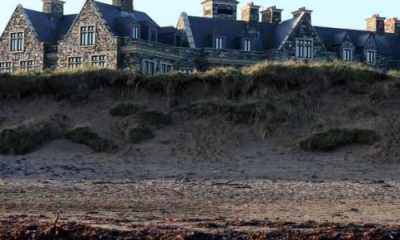 When 'wall' and 'Donald Trump' are used in the same sentence typically the mind will drift to scenes of blistering desert expanses in New Mexico or Arizona. The building of a wall to prevent the tide of illegal immigrants reaching US soil via its southern border was one of the pillars of the current US Presidents' election victory.
When 'wall' and 'Donald Trump' are used in the same sentence typically the mind will drift to scenes of blistering desert expanses in New Mexico or Arizona. The building of a wall to prevent the tide of illegal immigrants reaching US soil via its southern border was one of the pillars of the current US Presidents' election victory.
But it is a wall of a different more modest nature that is being discussed in the Irish Courts.
The 'Trump International Golf Links' at Doonbeg in County Clare in the west of Ireland has applied for permission to build a 38,000 tonne rock barrier to prevent the collapse of its golf course into the Atlantic Ocean. In its submission the company cited rising sea levels and extreme weather (aka 'climate change') as among the reasons for the advanced erosion of the coastline. Permission for a retaining structure was granted by An Bord Pleanála (which is usually the final word in the matter).
But a challenge by Mayo environmentalist Peter Sweetman could yet scupper the plans. In his action before the High Court he claims that no suitable assessment for what is a very sizeable scheme was actually carried out or published. The case was deferred until May.
The leader of the Irish Green Party Eamon Ryan had earlier commented:
'It's disappointing. We should be altering the golf course, not the coastline.'
He further speculated about the decision to grant permission, made by local Councillors:
'They wouldn't be human beings if they weren't sensitive to the fact that the golf course in question is owned by the president of the United States.'
|

KEEP THIS NEWSLETTER ALIVE!
FIND YOUR NAME IN OUR
GALLERY OF IRISH COATS OF ARMS

|

SADHBH, THE MOTHER OF OISÍN WHO WAS
CURSED BY A DARK DRUID
note: Sadbh is pronounce 'sigh-ve'. Fionn is pronounced 'fyun'. Oisín is pronounced 'ush-een'.
Sadhbh was the mother of Oisín, famed for his journey to Tir na nÓg, the land of eternal youth.
As a young woman Sadhbh had refused the advances of the Druid Fer Doirich (or 'Fear Doirche', meaning 'dark man') who was Druid to the Tuatha Dé Danann. Outraged by her refusal the Druid cast her into the form of a young deer, a doe, in which form she remained for more than three years.
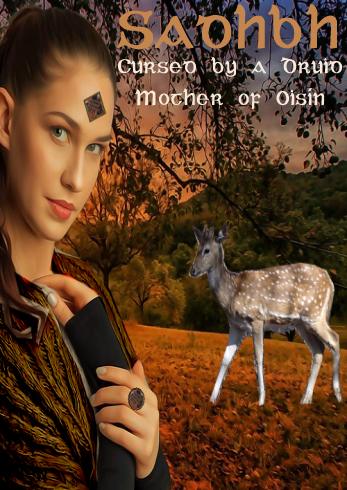 Taking pity on her, one of the men of the Dark Druid told her that if she entered a castle or home of the Fianna then the spell of the Druid would be broken.
Taking pity on her, one of the men of the Dark Druid told her that if she entered a castle or home of the Fianna then the spell of the Druid would be broken.
Sadhbh heeded his advice and escaped, eventually arriving at Almhuin (the Hill of Almu), the home of no less a legendary figure than Fionn MaCumhaill. When Fionn arrived home he observed the young doe and expected his hounds, Bran and Sceolan, to attack it. But they did not. For they too were human creatures that had been transformed into animal form and instead they approached the deer, protecting it.
Suddenly Sadhbh was transformed back into the beautiful woman she once was. Instantly Fionn fell in love and the couple were soon united in marriage. There was further joy for Fionn when his wife informed him that she was with child, but alas it is at this point that the Dark Druid once again cursed her life. For he had never stopped searching for Sadhbh and when he learned of her location he awaited his chance.
It was not long before Fionn had occasion to leave his home, as, since he was a man of the Fianna, he was expected to lead his warriors in battle. As soon as he left his dún (fort or castle) the Druid cast a false image of Fionn outside it in the hope that he could draw Sadhbh outside where his powers would again hold sway.
His trickery worked. Thinking she was greeting her husband Sadhbh ran from the dún only to be again transformed instantly by Fer Doirich back into the form of a young deer once more.
Fionn returned to find his wife missing. He was distraught and searched the lands of Ireland for more than seven years. Nearing despair he eventually found a young boy wandering on the stunning mountain, Benbulbin, and who had been living wild in the forests and mountains. His hounds, Bran and Sceolan, quickly approached and protected the boy.
Realizing that he had seen this scene before Fionn looked deep into the young face of this wild human creature and recognized the features of his missing wife. Amazingly he had now found his son that had somehow been born in human form.
He named him Oisín, who went on to become one of the greatest of all of the Fianna.
Sadhbh was never found, with legend having it that she still to this very day wanders the forests of Ireland, in the form that the Dark Druid of the Tuatha Dé Danann commanded.
Seemingly cursed for all time.
Alternative forms of the name Sadhbh: Sive, Sadb, Saibh, Saeve, Sadbh, Saba.
The town Cahersiveen in County Kerry roughly translates as 'The Fortress of Little Sadhbh'
Read more amazing stories of Irish legends and mythology.
|

THE SPIRIT HORSE
by Thomas Crofton Croker
The history of Morty Sullivan ought to be a warning to all young men to stay at home, and to live decently and soberly if they can, and not to go roving about the world.
Morty, when he had just turned of fourteen, ran away from his father and mother, who were a mighty respectable old couple, and many and many a tear they shed on his account. It is said they both died heartbroken for his loss: all they ever learned about him was that he went on board of a ship bound to America.
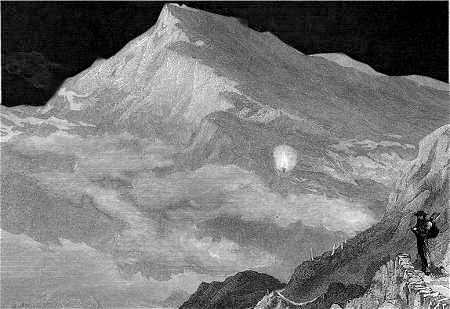
Thirty years after the old couple had been laid peacefully in their graves, there came a stranger to Beerhaven enquiring after them - it was their son Morty; and, to speak the truth of him, his heart did seem full of sorrow when he heard that his parents were dead and gone, but what else could he expect to hear? Repentance generally comes when it is too late.
Morty Sullivan, however, as an atonement for his sins, was recommended to perform a pilgrimage to the blessed chapel of Saint Gobnate, which is in a wild place called Ballyvourney.
This he readily undertook, and willing to lose no time, commenced his journey the same afternoon. He had not proceeded many miles before the evening came on. There was no moon, and the starlight was obscured by a thick fog, which ascended from the valleys. His way was through a mountainous country, with many cross-paths and by-ways, so that it was difficult for a stranger like Morty to travel without a guide. He was anxious to reach his destination, and exerted himself to do so; but the fog grew thicker and thicker, and at last he became doubtful if the track he was in led to the blessed chapel of Saint Gobnate. But seeing a light which he imagined not to be far off, he went towards it, and when he thought himself close to it the light suddenly seemed at a great distance, twinkling dimly through the fog. Though Morty felt some surprise at this he was not disheartened, for he thought that it was a light sent by the holy Saint Gobnate to guide his feet through the mountains to her chapel.
And thus did he travel for many a mile, continually, as he believed, approaching the light, which would suddenly start off to a great distance. At length he came so close as to perceive that the light came from a fire, seated beside which be plainly saw an old woman, then, indeed, his faith was a little shaken, and much did he wonder that both the fire and the old woman should travel before him, so many weary miles, and over such uneven roads.
'In the holy names of the pious Gobnate, and of her preceptor Saint Abban', said Morty, 'how that burning fire move on so fast before me, who can that old woman be sitting beside the moving fire?'
These words had no sooner passed Morty's lips than he found himself, without taking another step, close to this wonderful fire, beside which the old woman was sitting munching her supper. With every wag of the old woman's jaw her eyes would roll fiercely upon Morty, as if she was angry at being disturbed; and he saw with more astonishment than ever that her eyes were neither black, nor blue, nor gray, nor hazel, like the human eye, but of a wild red colour, like the eye of a ferret.
If before he wondered at the fire, much greater was his wonder at the old woman's' appearance, and stout-hearted as he was, he could not but look upon her with fear, judging, and judging rightly, that it was for no good purpose her supping in so unfrequented a place, and at so late an hour, for it was near midnight. She said not one word, but munched and munched away, while Morty looked at her in silence.
'What's your name' at last demanded the old hag, a sulphurous puff coming out of her mouth, her nostrils distending, and her eyes growing redder than ever, when she had finished her question.
Plucking up all his courage, 'Morty Sullivan', replied he, 'at your service' meaning the latter words only in civility.
'Ubbubbo!' said the old woman, 'we'll soon see that' and the red fire of her eyes turned into a pale green colour. Bold and fearless as Morty was, yet much did he tremble at hearing this dreadful exclamation.Hhe would have fallen down on his knees and prayed to Saint Gobnate, or any other saint, for he was not particular, but he was so petrified with horror, that he could not move in the slightest way, much less go down on his knees.
'Take hold of my hand, Morty', said the old woman, 'I'll give you a horse to ride that will soon carry you to your journey's end.' So saying, she led the way, the fire going before them, it is beyond mortal knowledge to say how, but on it went, shooting out bright tongues of flame, and flickering fiercely.
Presently they came to a natural cavern in the side of the mountain, and the old hag called aloud in a most discordant voice for her horse! In a moment a jet-black steed started from its gloomy stable, the rocky floor whereof rung with a sepulchral echo to the clanging hoofs.
'Mount, Morty, mount!' cried she, seizing him with supernatural strength, and forcing him upon the back of the horse. Morty finding human power of no avail, muttered, 'O that I had spurs!' and tried to grasp the horse's mane, but he caught at a shadow. It nevertheless bore him up and bounded forward with him, now springing down a fearful precipice, now clearing the rugged bed of a torrent, and rushing like the dark midnight storm' through the mountains.
The following morning Morty Sullivan was discovered by some pilgrims (who came that way after taking their rounds at Gougane Barra) lying on the flat of his back, under a steep cliff, down which he had been flung by the Phooka.
Morty was severely bruised by the fall, and he is said to have sworn on the spot, by the hand of O'Sullivan, and that is no small oath:
'Nulla manus, Tam liberalis, Atque generalis, Atque universalis, Quam Suilivanis.', never again to take a full quart bottle of whisky with him on a pilgrimage.
|

HALF AN EGG
by Marie O'Byrne
I have many fond memories of my childhood, growing up in Greystones, Co Wicklow in the 1960's. In Particular I remember the busy mornings sitting around the kitchen table with my eleven brothers and sisters while my dear mother served us all a hot meal to set us up for the long school day ahead.
Almost every morning she fed us porridge from the big metal pot that was sitting on top of the old range. She was up at the crack of dawn, well before any of us, and she always had the fire going and the kitchen warm and toasty for us all before we got up.
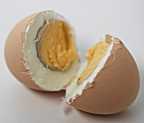
Having to feed thirteen people every day was no small task and it made a lot of sense to use just the one big pot so that there would be plenty for everyone. Our mother ran a tight ship and she always managed to have good, wholesome warm meals on the table for us all.
On some rare occasions however, we were lucky enough to have a change: we got a boiled egg and toast with our cup of tea for our breakfast. On those special days there was an unspoken rule that you cut your egg in half and handed over the top part of the egg to your sister or brother that was sitting next to you. This was due to the fact that there simply was not enough eggs to go around such a large family and it became an automatic action on our parts. I rarely remember having a whole egg all for myself.
My father in his wisdom often said that 'Half an egg is better than no egg!'
I vividly remember one St. Patrick's morning when we were all sitting around the table having our breakfast of boiled eggs. I automatically cut my egg in half and was about to pass the top part over to my sister Eileen. When my mother saw me, she gently raised her hand up in the air to stop me.
'Oh, No, Marie, today is St. Patrick's Day , it's a very special day for us all, and you get to have a whole egg all for yourself pet! Everyone get's a whole egg on St. Patrick's Day!'
She beamed with gratitude and a real sense of pride.
'Really! Ah, sure this is great Ma' said Eileen. We both giggled and laughed as we very happily tucked into the lovely gooey yoke!
Sometimes I wish I could go back in time to those simpler days. Even tough materially speaking we were very poor, in other ways we were abundantly rich. We had loving caring parents, lot's of fun and laughter playing with each other, a big glowing fire and a warm cosy, cottage.
I wouldn't trade any of it, even though I only got half an egg.
Marie O'Byrne is author of three Irish Novels available from www.marieobyrne.com.
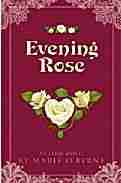
|

HELP KEEP THIS NEWSLETTER ALIVE!
|

IRISH NEWSPAPERS REVISITED
 note: Maria Island prison was a British operated internment camp in Tasmania.
note: Maria Island prison was a British operated internment camp in Tasmania.
William Smith O'Brien was a 'Young Irelander', an Irish Nationalist.
THE MURDER OF SMITH O'BRIEN
Anglo-Celt, Published in Cavan on June 7, 1850
(From 'The Nation' Newspaper)
If there be tenderness in the women, and range in the men left in Ireland, there is news to-day to flood the land with tears; to fill the air with curses.
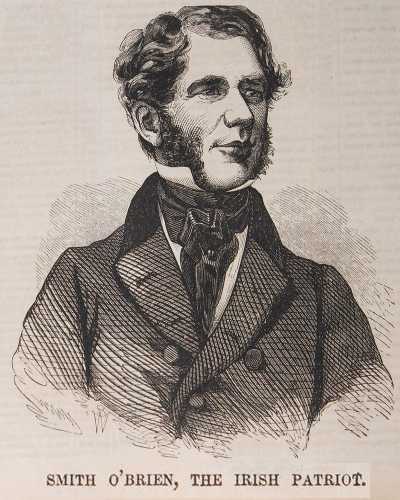
They are killing Smith O'Brien by slow murder in Maria Island.
We have been silent for three weeks, believing that his aristocratic and parliamentary friends would interpose effectively on his behalf, as they promised to do. But they have paltered with his interest, ruining it with faint, hesitating help, and quenching hope among those who were manlier and more devoted. Meantime, a voice of remonstrance is again heard across the ocean, demanding, is O'Brien to be murdered?
Cruelties the most terrible - cruelties which it maddens to think of, and shames to mention - are inflicted on this defenceless man by the Executioner of British vengeance.
He is caged in the closest solitary confinement. His food is scanty, and loathsome. He has no comforts, no attendance. He never sees the face or hears the voice, of a friend. He is denied the common requisites of decency. For months he has not been allowed a change of raiment, or permitted to cleanse his dress.
This will be questioned, disputed, disbelieved. No wonder; for it is monstrous and incredible. But we write every syllable of it on the authority of one as incapable of falsehood or exaggeration as of murder. It is the literal truth.
In solitude, in privation, in filth, in rags lives this Irish gentleman; this noble man who lost liberty, home, family - ALL - for Ireland.
Nor is this the whole. In the foul den where is thrust, like a chained reptile, one generous girl of the age of ten years, daughter of the governor, sought, with the instinctive charity of her sex, to solace the captive's care, and lighten his suffering by kindly offices; and forthwith, on pain of new privation, O'Brien was forbidden ever to speak to her again. He lost this innocent familiar, whose childish beauty and guilessness perhaps, spoke to his father's heart of the orphaned darlings who weep for him at home.
What multitudes have melted into tears over this very incident in the prison revelations of Silvio Pellico; and here we have it re-enacted in the life of a man from whom no human creature ever suffered a wrong.
These atrocities are inflicted by the Governor of Maria Island; an official, whose brutality has earned for him in the colony, the title of "The Black Serpent;" a tyrant, whose name is a terror, and whose presence is despair to the hapless victims of his infernal cruelty.
In this monster's power; tortured, outraged, maddened, lives your countryman; the son of your kingliest house; the generous patriot who fought and fell for you and us all.
Is this law? Is this justice? Who is so brutal here as to defend such barbarity? What partisan of British rule - what representative of British authority dare stand up in these islands and vindicate this dark, cowardly, and hellish persecution?
Does the law of God justify it? Does the law of man ordain it? Will the people of England sanction it? Will the peeple (sic) of Ireland endure it?
It is a crime horrible enough to provoke the indignation of humanity. What wonder if the burning manhood of Ireland arose in arms against the government that thus sins against justice and our race; that thus murders by slow death our dear brother; the stainless, heroic champion of our liberty.
Men of Ireland - and let God and men, the time and the eternity, witness the solemnity and truth of our invocation! - whether you be Protestants or Catholics - whether you are arranged beneath the Green Flag of our Fathers, or under the crimson banner of St. George - whether you desire Irish independence or cherish a Union with England, your sacred duty is identical. You must interfere, and save this man's reeson. (sic) You must interfere and save this man's life; for, we tell you, both are threatened.
We say this advisedly. No human constancy can long withstand the torturing cruelty O'Brien suffers. No bodily strength can triumph over the privations O'Brien endures.
If you will not be accomplices in the murder, which is designed; if you would not have O'Brien's blood red in judgment on your souls - we say to you, interfere. Denounce this iniquity. Terminate this dread agony. Expostulate with this cruel, malignant, assassin government. Save him from death, or worse than death. These tidings have produced a profound impression in Dublin. They have excited intensest indignation. A committee is being formed, of men of all parties; and, if we have not mistaken Irish hearts, there will be a denunciation that shall ring through the land like the judgment-peal - a remonstrance which it will not be prudent for any government to despise, or safe for any government to disobey.
We hear, indeed, that the Queen of England comes to Ireland again this summer - comes for the ovation that monarchs love from petted slaves. But we warn her and her ministers that surely as she sets foot on Irish soil, while O'Brien is thus tortured and degraded, so surely, wherever she turns, shall his name be thundered in her ears as a malediction - so purely shall his blood be flouted in her face. This promise we will see fulfilled.
|

HELP KEEP THIS NEWSLETTER ALIVE!
|

GAELIC PHRASES OF THE MONTH
| PHRASE: |
Ghearr mé. Níor ghearr mé. |
| PRONOUNCED: |
hug may. neer hug may. |
| MEANING: |
I cut. I didn't cut. |
| PHRASE: |
D'ith mé. Níor ith mé. |
| PRONOUNCED: |
dit may. neer it may. |
| MEANING: |
I ate. I didn't eat. |
| PHRASE: |
D'ól mé. Níor ól mé. |
| PRONOUNCED: |
dole may. neer ole may. |
| MEANING: |
I drank. I didn't drink. |
View the Archive of Irish Phrases here:
http://www.ireland-information.com/irishphrases.htm
|

COMPETITION RESULT
The winner was: Kimberly.obrien2@houstonisd.org
who will receive the following:
A Single Family Crest Print (usually US$24.99)
Send us an email to claim your print, and well done!
Remember that all subscribers to this newsletter are automatically entered into the competition every time.
I hope that you have enjoyed this issue!

by Michael Green,
Editor,
The Information about Ireland Site.
http://www.ireland-information.com
Contact us
Google+
(C) Copyright - The Information about Ireland Site, 2018. P.O. Box 9142, Blackrock, County Dublin, Ireland Tel: 353 1 2893860
|
All Content is Copyright (C), 2018 Ireland-Information.com
unsubscribe/disconnect from Ireland here

The Information about Ireland Site
(C) Copyright - IrelandInformation.com, 1998-2017
| |